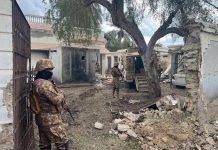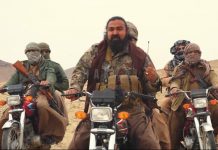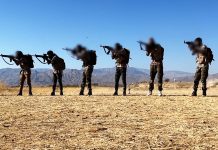Writer: Burzkohi
Translator: Zamur Baloch
War is a tragic yet defining reality that shapes contemporary debates, changing perspectives and influencing actions. To fully grasp its intricacies, we must look beyond rigid, stagnant ideologies and fixed beliefs, testing our courage to confront the facts and circumstances of the present era. A logical understanding of war cannot be achieved through outdated ideologies or passive observation but only by living through it and experiencing its stages directly. Brave warriors embrace death, driven by a commitment to a higher purpose that transcends the dangers they face. For this reason, re-evaluating beliefs and understanding current realities is crucial to achieving the national goal of independence.
The Baloch national liberation movement has embraced the consequential reality of war and remains steadfast in its journey toward a decisive end despite numerous challenges. To understand the changes within the components of this struggle and how they have evolved into new forms, we must set aside outdated beliefs and actively engage with new knowledge and strategies. Conscious decisions in war, especially self-sacrificial acts, must be assessed within their own contexts rather than being constrained by limited perspectives. New realities exist beyond traditional viewpoints. Philosopher Khurshid Javed, in his book Revolutionary Political Ideas (Vol. II), discusses the dynamic nature of change. Referring to Stalin’s ideas, he writes, “Nothing in nature is in a state of rest; everything is in constant motion. Change does not signify death but rather adaptation to a new form. The conflict between opposites drives growth and transformation.” When viewed from this perspective, the process of change in war becomes clear, helping us to break free from static thinking.
Understanding the connection between our thoughts and external reality is essential. As Khurshid Javed notes, “Thought is a product of the human mind, which is itself made of matter. Consciousness, therefore, reflects reality, which exists outside the human mind.” By pursuing a deeper understanding of sacrifice and the harsh truths of war, we can overcome the limitations of internalized values and obsolete standards that hinder us from fully grasping new realities. Insights from thinkers and social psychologists on consciousness and collective awareness are invaluable in understanding new forms of war and fresh perspectives in national movements. Hungarian Marxist philosopher György Lukács, for example, highlights how consciousness, when embraced as part of the objective world, transforms that world. He writes, “Consciousness is not an isolated awareness but a state that reshapes its surroundings. When the working class, for instance, becomes aware of its identity, it changes fundamentally.”
In a national context, this collective awareness enables individuals to contribute meaningfully to a cause. As Lukács argues, ethical responsibility does not exempt individuals from their role within the collective; each person’s actions affect the whole. This is why Goethe said:
“It is here that lack of confidence has to be dealt with and cowardice be buried.”
To understand effective and decisive change within the Baloch national movement, a contemporary approach is essential, rather than relying solely on the historical framework of guerrilla warfare. War is both a science and an art; therefore, the evolution of strategy should be weighed philosophically. Empiricism, a key philosophical approach, values experience and observation over theory to gain knowledge. Practical evaluations and direct observation are key to understanding war in real time, clarifying facts beyond theoretical constraints. By observing changes in the nation through this lens, we can better understand how the nation perceives war and the lengths to which it will go for its cause. National dedication drives the direction of any struggle.
Our approach to change depends on our insight, vision, and capacity for imagination. Internally, we may fear new ideas, seeing them as threats to our familiar beliefs. Under the shadow of outdated ideals, we may resist abandoning ineffective strategies, fearing the loss of former validations. Marxist theorist Regis Debre describes this tendency in Revolution in the Revolution: “We are never completely contemporaneous with our present. History moves forward in disguise and appears on stage wearing the mask of the preceding scene. Each time the curtain rises, continuity must be re-established. The fault lies not with history but with our vision, which is clouded by memories and past images. We see the past superimposed on the present, even when the present is a revolution.”
No strategy in war is universally or permanently valid. In war, decisive moments arise when the mind remains flexible, focused on the ultimate goal rather than bound by static beliefs or material concerns. Strategy in war is neither a static nor divine prescription but a continuous process of adjustment. Debre articulates this point in Revolution in the Revolution, noting that “revolutionary armed struggle in every continent and country has to face specific situations.” These conditions are neither fixed nor preordained. Discovering and understanding any matter demands years of dedication and sacrifice.
The most dangerous form of thinking is to assume we possess ultimate wisdom. This presumption opens the door to actions that may serve individual pride but fail to support the collective good. Our actions mirror our thoughts. When pride or prejudice drives us, results may seem temporarily satisfying but ultimately lead to emptiness. Debre critiques this intellectual rigidity, observing that Fidel Castro attributed some guerrilla failures to intellectual arrogance. The intellectual, Debre argues, “will try to live by preconceived ideological constructs, learning more slowly and showing less flexibility.”
Conscious warriors confronting a barbaric enemy understand that nothing is final in war, except the goal itself. They recognize the need for innovative strategies that adapt to contemporary realities. Theories of guerrilla warfare have their place, but warriors must distinguish between devotion and wisdom, as Debre suggests. Focusing on the end result is what matters, not the specific path taken.
In understanding war, empirical knowledge is more valuable than outdated traditions and fixed beliefs. To prevent the past from overshadowing the present, we must engage in research and creation and fully embrace the process. In today’s context, distinguishing between action and intention has become essential. Without a shift in perspective, movements risk stagnating, unable to comprehend reality on authentic terms. As the Greek writer Nikos Kazantzakis aptly said:
“We cannot change reality; let us change the eyes which see reality.”
Disclaimer: The views and opinions expressed in this article are those of the author and do not necessarily reflect the official policy or position of The Balochistan Post or any of its editors.






























